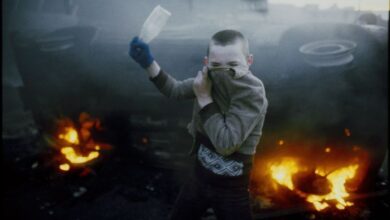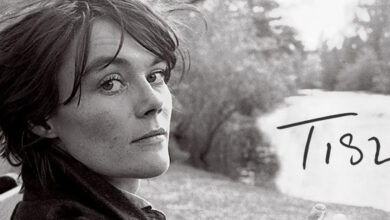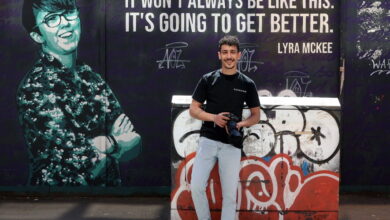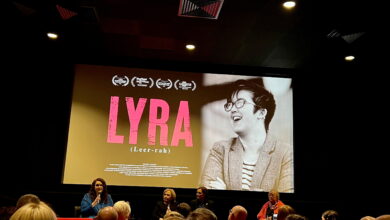The day I was shot
When BBC correspondent Frank Gardner lay helpless on a Saudi street, blood pouring from his bullet-riddled body, he cursed himself for getting too close to Al-Qaeda. Here he recounts that terrible day
 “Do you have time for some supper?” called Amanda from the kitchen. I looked at my watch. It was Tuesday June 1 2004 and the car taking me to Heathrow airport would be here in 20 minutes, but I was packed and ready to go. “I’ll be right down,” I replied, and walked out of our top-floor bedroom, unaware that that was the last time I would ever see it.
“Do you have time for some supper?” called Amanda from the kitchen. I looked at my watch. It was Tuesday June 1 2004 and the car taking me to Heathrow airport would be here in 20 minutes, but I was packed and ready to go. “I’ll be right down,” I replied, and walked out of our top-floor bedroom, unaware that that was the last time I would ever see it.
Three days earlier there had been a bloodthirsty raid by Al-Qaeda fanatics in the eastern Saudi town of Al-Khobar. The terrorists had found a prominent British expatriate, Michael Hamilton, shot him dead, tied his body to their car bumper and dragged it around town in some kind of grisly parade of their power.
Then, masquerading as government security forces, they had marched into a residential complex housing many westerners, Indians and Filipinos who worked in the vast oil industry. Rounding up all those they suspected of being non-Muslims, according to the testimony of survivors, the militants coolly slit the throats of the “non-believers”. By the time order was restored, 22 people had been killed.
Saudi Arabia’s charismatic ambassador to London at the time, Prince Turki al-Faisal, had wasted no time in touring British television news studios to defend his government’s record in tackling terrorism. A former Saudi spymaster, Prince Turki was unusually open and frank. He encouraged British journalists to visit, helping with visa requests. I was to go there for BBC News with Simon Cumbers, a freelance Irish cameraman and trusted veteran of countless assignments.
Amanda and I sat up talking late that night. My wife was understandably anxious; clearly there were people on the loose in Saudi Arabia who hated westerners with a passion.
“Do you have to go to Saudi?” she asked. I did not. Unlike some other networks, the BBC is quite reasonable about asking people to go to difficult places and I have never been told the equivalent of “Go to Baghdad or pick up your P45”. But Saudi Arabia was not considered a high-risk country like Iraq or Afghanistan; I knew of no visiting journalists who had ever been threatened there.
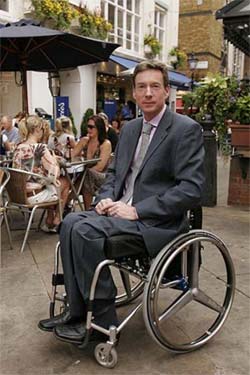 “Then are you taking a flak jacket?” asked Amanda. This was a touchy subject between us: she has always maintained I had agreed at our wedding never to be a flak-jacket journalist, a pledge I have no recollection of making. In truth I have never seen myself as a “war correspondent”, believing that no story is worth getting shot for, although there are occasions when it is wise to wear a flak jacket as a precaution. But I did not feel this was one of them: no civilians wore flak jackets in Saudi Arabia and if anything it would only attract unwelcome attention. Amanda’s concerns troubled me, however, not just because I did not want her to worry while I was away but because she has an uncanny knack of being right about places she has never even been to. “So what are you going to say when terrorists have got a gun to your head?” she asked me.
“Then are you taking a flak jacket?” asked Amanda. This was a touchy subject between us: she has always maintained I had agreed at our wedding never to be a flak-jacket journalist, a pledge I have no recollection of making. In truth I have never seen myself as a “war correspondent”, believing that no story is worth getting shot for, although there are occasions when it is wise to wear a flak jacket as a precaution. But I did not feel this was one of them: no civilians wore flak jackets in Saudi Arabia and if anything it would only attract unwelcome attention. Amanda’s concerns troubled me, however, not just because I did not want her to worry while I was away but because she has an uncanny knack of being right about places she has never even been to. “So what are you going to say when terrorists have got a gun to your head?” she asked me.
I tried to reassure her – and myself – that we were going to tread extremely carefully. We would put ourselves entirely in the care of our Saudi minders, and knowing how over-cautious they tend to be our only problem should be not getting enough access to interesting subjects.
One of the last things I packed was a miniature copy of the Koran, one of several I keep to give as presents to hospitable Muslim hosts, a gesture that always brings great appreciation.
I kissed my wife and children goodbye and watched them recede through the car’s back window on that warm summer night. I tried to dismiss the feeling of unease, reminding myself that I and had been to Saudi Arabia countless times and that I’d always felt safe there.
Soon I was at Terminal 3 with Simon. He and his wife Louise had their own freelance production company, and Simon had recently felt bad about asking one of his cameramen to go to Baghdad. He had resolved that he would take the next filming trip to the Middle East.
I remembered Al-Khobar as a quiet, dull place. There was no entertainment and little for expatriate westerners to do other than drive across the nearby causeway to freewheeling Bahrain.
When we reached the Al-Khobar Meridien, I could hardly believe it: there was a sandbag gun emplacement outside, backed by an armoured car. I had often stayed here in my former incarnation as a Gulf banker, but even during the dark days of the Gulf war in 1991 there had never been anything like this atmosphere of brooding tension. I had only been away 11 months and already this was not the Saudi Arabia I knew.
The next few days passed in a whirlwind of filming, driving and frantic editing in our hotel room, followed by a dash up the motorway to the nearest satellite uplink station in time to make the one, six or 10 o’clock TV news in Britain; in other words, pretty much typical of a foreign newsgathering trip following a big event.
In the middle of this schedule I was invited to attend the memorial service for Michael Hamilton. I sat at the back, as discreetly as I could, taking notes for the report I needed to file for the Radio 4 six o’clock news. I had never known Hamilton, but I was overwhelmed by the sadness and futility of his death. One had only to look round the room at his mourners to judge his popularity: Saudis, Britons, Bahrainis and Indians had all come to pay their respects.
The British ambassador, Sherard Cowper-Coles, read a tribute and that night we interviewed him in his hotel room, sharing my packet of Walkers shortbread fingers. He had a refreshing tendency to tell it how it is.
“Saudi Arabia does have a serious problem with terrorism,” he said, “and I predict there will be more attacks on westerners.” Prescient as he was, he could not have foreseen that Simon and I were to be Al-Qaeda’s next victims.
On the Friday, the day off in Saudi, we took the short flight to Riyadh and spent the afternoon at a barbecue with British expatriates in their walled compound. Life here had recently taken a turn for the worse, they said.
They had accepted for some time the risk of being caught up in a suicide bombing but now there was a new horror: being executed in cold blood on the basis of one’s religion or the colour of one’s skin. The expats had heard reports of Al-Qaeda scouts marking westerners’ numberplates with chalk as potential targets.
There was a chicane of concrete roadblocks outside our Riyadh hotel, but there was no visible armed guard on duty and this worried me. If Al-Qaeda decided to enter, I did not believe there would be much to stop them.
In my room I went over to the window and decided that if there was an armed raid I could probably jump down on to the tree below, which would break my fall. I felt that a raid was unlikely, though; the summer heat meant there were so few western guests in the hotel it would hardly have been worth Al-Qaeda’s time.
Simon and I wanted to report how the Saudi authorities were combating the country’s Al-Qaeda-inspired terror cells. We spent a morning traipsing round the ministry of information, applying for permission to film. Saudi Arabia does not allow unescorted film crews, partly for their own safety. Many Saudis are deeply suspicious of foreigners with cameras, convinced they are trying to film their women or pass the footage to some western government.
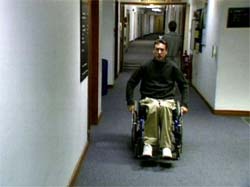 We asked to film three things: checkpoints and other physical security measures; an interview with a senior counter-terrorist official; and a general view towards Al-Suwaidi, a restive area of south Riyadh where there had been a shoot-out six months earlier between police and an Islamist cell leader, Ibrahim al-Rayyes, who had been killed.
We asked to film three things: checkpoints and other physical security measures; an interview with a senior counter-terrorist official; and a general view towards Al-Suwaidi, a restive area of south Riyadh where there had been a shoot-out six months earlier between police and an Islamist cell leader, Ibrahim al-Rayyes, who had been killed.
The ministry of information was not encouraging about our requests and – as Arab government ministries close at 2pm – we went back to our hotel for lunch and a swim, planning to fly home the next day. I took a call from BBC2’s Newsnight, asking me if we could stay on, but I said we were reluctant to hang around in this tense atmosphere when we had nothing firmed up to film.
So it was somewhat to our surprise that permission came through in mid-afternoon to film around Riyadh, including the district of Al-Suwaidi. Reluctantly – because we had mentally finished our trip – we roused ourselves from the pool and went up to our rooms to change.
I watched a few minutes of the D-Day 60th anniversary celebrations on television, admiring the veterans in their berets and medals and pleased that my father had made the trip back there with my mother.
We piled our camera gear into a government minivan. Mubarak, a black Saudi, one of thousands of Arabs with African ancestry, was at the wheel. Beside him was Yahya, our assigned “minder” from the ministry. I had never worked with him before but he assured me immediately that he was an old hand at chaperoning foreign film crews.
Yahya seemed very easy-going and far more eager to help than most of the government minders I have encountered in the Arab world. We were free to go wherever we chose in Riyadh, he said, but we could not film checkpoints.
We asked to go straight to the edge of Al-Suwaidi and drove south through the suburbs of Riyadh. They were unremarkable to look at: low, whitewashed, flat-roofed buildings, usually above a row of shops selling cold drinks, fabric and spare car parts.
People were just starting to emerge on to the streets after the mid-afternoon siesta; a few of the men, I noticed, wore the short robes and long beards of devout fundamentalists. Here and there was a neon-lit fast-food joint, a sandy backstreet, an overflowing litter bin. One could sense this was a poorer part of town, but the poverty was not extreme.
When we drew up on the edge of Al-Suwaidi it looked exactly like every other residential housing area I have known in the Gulf states: villas surrounded by high walls topped by purple bougainvillea. Patches of flat stony wasteground separated the buildings, and while there was some graffiti on the walls there were also several expensive four-wheel-drive cars parked in the shade.
The area was now calm, we had been assured, but still we had no wish to go into it, only to film from a distance to give the viewer an impression of what the place looked like.
There was not a soul around, although after a while some laughing children appeared and wanted us to film them. Simon got me to do what is known as a “walking piece to camera”, one of those earnest, strolling soliloquies from the reporter that is supposed to set the scene in context, or at least prove to the viewer that the reporter has been there.
Simon and I had agreed in advance that we would spend no more than 10 minutes here, but Yahya was very relaxed and certainly there was nothing to suggest any kind of threat – no furtive figures darting into doorways, no twitching curtains – so we did several takes from different angles to get the filming just right.
Again and again I strolled across the wasteground towards the camera, pausing to deliver my words and point out the villas in the background where police had traded fire with militants six months earlier.
After about half an hour we were on the verge of packing up when a car pulled up close to our minivan. I was vaguely aware of some people in the distance, but when a young Saudi got out of the car there was nothing suspicious about him at first.
Like every adult male Saudi, he wore the traditional white thaub, essentially a smart shirt that extends all the way down to the ankles. He looked very young, perhaps still in his teens, and had a kindly face with a hint of a smile, almost as if he knew us or our two Saudi escorts. Was he coming to ask directions? Perhaps he knew the driver and had come to chat.
Looking straight at me, he called out, “Assalaamu aleikum” (“Peace be upon you”). All over the Arab and Islamic world this is the traditional Muslim greeting, a reassurance to a stranger that you wish him no harm.
I replied with the standard response: “Wa aleikum assalaam wa rahmatullah wa barakaatuh” (“And upon you the peace and the mercy of God and His blessings”).
The man paused, a curious look on his face, then with no sign of haste he reached his right hand into what must have been a specially extended pocket sewn into the breast of his thaub. I did not need to see the weapon to know what was coming next. It was like a film with a predictable ending.
“No! Don’t do this!” I shouted instinctively in Arabic.
He pulled out a long-barrelled pistol. Oh my God, I thought, this cannot be happening.
I ran for my life, sprinting away from our van and into the deeply conservative quarter of Al-Suwaidi. There was a loud crack behind me and I felt something sting my shoulder. I didn’t know it then but the bullet passed clean through, hitting the shoulder bone on the way.
My adrenaline must have been pumping because I remember it being no more painful than a bee sting, and I ran on, trying to put as much distance as possible between me and the gunman. For a few brief, happy seconds I thought I was actually going to make it, trusting in the power of my legs to outrun my attackers.
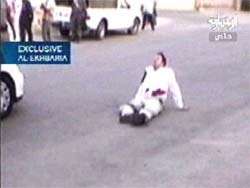 I felt almost euphoric at the prospect of escaping them, and I began to look ahead for cover. There was not much. Everywhere I looked there were high, windowless walls, locked doors and wide open spaces. But it was academic; I never made it that far.
I felt almost euphoric at the prospect of escaping them, and I began to look ahead for cover. There was not much. Everywhere I looked there were high, windowless walls, locked doors and wide open spaces. But it was academic; I never made it that far.
There was another loud bang and the next thing I knew I was down on my front on the tarmac, felled by a bullet in the leg. I had run slap into the terrorists’ second team; they had overtaken me in a minivan to cut off my escape. Now they were crowded inside the open sliding door of their van while I lay prone and helpless on the ground, looking up in horror at this group of Islamist gunmen.
They appeared very different from my first attacker; they had made no attempt to disguise their jihadi appearance. Their thin, pale faces were framed by wispy, unkempt beards in the style of most extremists and they had the look of people who spent all their time indoors.
Instead of the neatly arranged headdresses with a sharp crease in the middle worn by ordinary urban Saudis, these men wore theirs wound tightly round their foreheads like a bandage. It was the isaaba, the dress worn by jihadi fighters who consider they are about to go into battle, the same style worn by the 9/11 suicidal hijackers in their video testimonies and by Mohammed Siddique Khan, the leader of the July 7 London bombers, in his posthumously released video warning to the West.
I realised then that I was doomed. These men were no casual, have-a-go amateurs; they were the real thing, a hardcore Al-Qaeda terror cell bent on attacking their government, killing westerners and “cleansing the Arabian peninsula of infidels”.
In that instant I glimpsed faces driven by pure hatred and fanaticism. I pleaded with them in Arabic, as so many hostages have done in Iraq, while they held a brief discussion as to what to do with me. It did not take long. They responded to my pleas by opening fire once more.
EVEN THEN it crossed my mind how unfair this was. I had spent four years studying Islam for my degree, learning Arabic, reading and translating the Koran and other Islamic texts. I had lived happily among Arab families, fasted with Bedu tribespeople in Jordan, taught English to the impoverished family of an Egyptian taxi driver in a verminous Cairo slum.
For the past few years I had tried hard to explain the complexities of the Middle East and the thinking behind the Al-Qaeda phenomenon to western and international audiences. And this was my reward? A bunch of bullets in the guts from men who had convinced themselves they were killing in the cause of Islam. It just did not seem right.
From somewhere close behind me a gunman stood over me and pumped bullets into the small of my back, hitting my pelvis and sacral bones and causing immeasurable damage to my internal organs. I don’t remember it hurting at the point of impact, just a deafening noise each time he squeezed the trigger and a sickening jolt as the bullets thudded into my guts. Each time he fired it was as if a giant hand had picked me up and slammed me down on the tarmac. It rocked my whole inner body frame, like the chassis of a car in a head-on collision.
Bloody hell, I thought, I’m really being shot. I’m taking a lot of rounds here. So is this where I float gracefully up into the sky and look down at my body sprawled out below? What an idiot you are. You’re supposed to report on Al-Qaeda, not get so close to them you end up getting killed!
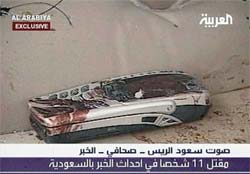 There was one thought in my head that overrode all the others. I have to survive this, I told myself, for the sake of Amanda and my girls. I cannot leave them on this earth without a husband and a father.
There was one thought in my head that overrode all the others. I have to survive this, I told myself, for the sake of Amanda and my girls. I cannot leave them on this earth without a husband and a father.
I closed my eyes and kept as still as I could, face-down on my front. The shooting had stopped and there was a discussion going on in Arabic. One of the terrorists was getting out of the van and walking towards me.
I held my breath, playing dead while I listened to his footsteps drawing closer. I felt a hand reach into the back pocket of my trousers and remove Simon’s radio microphone (which they left at the scene). Then he fished into the other back pocket and took out that miniature copy of the Koran that I had remembered to pack in London.
There followed a terrifying few seconds when any number of horrors could have been inflicted on me. In the previous week this same cell had dragged Michael Hamilton’s lifeless body from the back of their vehicle. Would they now be tempted to do the same to me?
The week after the attack on us an American helicopter technician, Paul Johnson, would be kidnapped in Riyadh and beheaded, his captors filming his execution then keeping his severed head in the family freezer for days until it was discovered in a police raid. I have no idea if the Koran in my pocket saved my life or if the terrorists were by now convinced they had finished me off.
For me, lying punctured and bleeding on the ground, there suddenly came the sweetest sound in the world: the noise of my attackers revving up their engine and driving off. They were leaving me for dead. There followed total silence. No wail of sirens, no crying of children, no clatter of approaching feet.
Ominously, there was no sign of Simon, the minder or the driver either. It seemed I was completely alone. Why wasn’t anybody coming to my rescue?
I felt many things at once: I was relieved and amazed to be still alive, I was furious at the injustice of this attack, yet I was surprisingly calm. I waited until I thought the coast was clear then I flipped over on to my back, supporting myself half upright with extended arms so I could call out more effectively for help.
As I turned I felt my legs roll over like two dead logs, my feet flopping flat and lifeless against the ground. My right leg was bent in and out at crazy angles and I could feel nothing below the waist.
“Damn,” I remember thinking, “that’s not good. If I survive this I’m going to need some serious physiotherapy.” Unseen by me, someone was discreetly photographing me with a mobile phone and this was the grainy image that appeared in newspapers and on TV within hours.
By now the adrenaline had worn off and I was in the most excruciating, indescribable pain. The clean white shirt I had pulled on an hour ago for the piece to camera was saturated in blood. I had lost count of the number of times I had been shot.
In a cracked and desperate voice I cried out in Arabic for help. My cries were of base, animal pain. I was emitting sounds I did not even recognise.
At first no one came; the place was deserted. Then a handful of local Saudi men drifted on to the scene and my heart leapt. With their straggly beards and loosely wrapped headdresses they looked disturbingly like the people who had just shot me. Had they come to finish me off?
Before I had time to think about it they were joined by a dozen more locals. Despite the pain, I felt reassured by the crowd, which was now getting sufficiently large that if anyone was carrying a concealed weapon he was unlikely to pull it out in front of so many witnesses.
And then the strangest thing happened. Nobody helped me. In Muslim society, charity and hospitality are legendary. I have known Egyptians cross four lanes of rush-hour traffic to help with a flat tyre; an Omani minister once gave me his prized walking cane inscribed with his title in silver; Indonesians have slaughtered their sole goat to share with me. And yet here I was, lying in the road, obviously very badly injured, and yet nobody came to help.
That is one of the things I remember most: the terrible feeling of loneliness, the sense that I was completely on my own, that I could not rely on anyone to help me. I was obviously an object of interest: there was plenty of discussion and pointing at the empty cartridge cases that lay all around me. But something to staunch the blood? A pillow? A glass of water? Even a few words of comfort? Forget it.
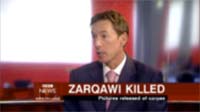 The only charitable explanation I can think of is that perhaps nobody dared come near me lest they get dragged off to the police station as a witness.
The only charitable explanation I can think of is that perhaps nobody dared come near me lest they get dragged off to the police station as a witness.
Staying alive became an endurance test. I feared that if I blacked out and lost consciousness I would be dead by the time I reached hospital, so I willed myself to stay alert.
I had never considered myself to be particularly tough (I have always been a complete wuss about cold showers), but I had had some experience of endurance challenges, having run two marathons at university and completed Hong Kong’s 100km MacLehose Trail in under 24 hours. But this was different, it was like nothing I had ever known in my life. Bizarrely, I remember thinking, “Ah, but Frank, you have never given birth and that must be quite an ordeal.”
When the police finally showed up after about half an hour, alerted by somebody in the neighbourhood, they joined a growing throng of people all gawking at me from a distance. It was strange that in years of broadcasting I had never felt self-conscious, despite knowing that millions of people were watching. Yet here I was, being closely observed by 30 or so people, and it did not feel good.
By now I had lost a lot of blood. I was still conscious, but there was no sign of an ambulance or any medics; the policemen seemed unsure of what to do with me.
Somebody asked me if I had noted down the numberplate of the attackers’ van. I think I replied that I had been too busy getting shot to notice, but I did tell them I was British. I knew that Britain was almost as unpopular as America in some quarters here, because of the Iraq invasion, but I hoped that someone would get word to the British embassy.
Several khaki-clothed policemen manhandled me into the back of their patrol car. Aware that I was a bloody mess of broken bones and gunshot wounds, they laid me lengthways on some kind of plank contraption. They did the best they could, but the length of my body was greater than the width of their car. And so I remember my head and shoulders protruded ludicrously from one of the back windows.
The police car drove off at speed, sirens blaring, lurching initially over rough bumpy wasteland. I had no idea where they were taking me, but I was in too much pain to care. On top of the agony the bullet wounds were causing me, I now had to grip on to the roof of the car to stop my head getting knocked about.
We pulled up at last at the Al-Iman hospital – not, I learnt later, one of Riyadh’s finest. There was a huge commotion at the doorway as everyone argued how best to extract me from my rear compartment and on to a hospital trolley, while I lay groaning and writhing but still conscious. At one stage I was being pulled in opposite directions.
I was rushed through the hospital doors and into the operating theatre. My last memory was of looking up at the faces of the surgeons. They wore an expression close to panic. Then my pleas for painkillers were answered. A needle slid into my arm and I sank at last into oblivion.

